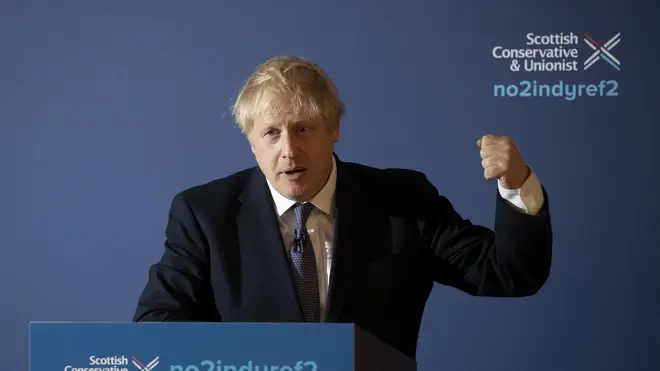
Paul Brand 10am - 12pm
28 November 2019, 06:46

Boris Johnson is on course to secure a majority of 68 seats in the upcoming general election, a major poll has predicted.
According to seat-by-seat analysis by YouGov, if the election was held today the Conservatives would win 359 seats, Labour 211, the SNP 43 and the Lib Dems 13.
The damning poll predicts Jeremy Corbyn's Labour Party could potentially suffer its second-worst postwar defeat.
According to the results, Labour is expected to lose 51 constituencies - 44 to the Tories, five to the SNP and one to the Lib Dems.
In 2017, the YouGov MRP poll was the only poll to correctly predict we would have a hung parliament.
⚡️ YouGov's general election MRP model has finally arrived- see all the highlights herehttps://t.co/q1t1WV33Zp pic.twitter.com/L5FfTzSp5f
— YouGov (@YouGov) November 27, 2019
All MPs who left their parties to join the Liberal Democrats are predicted to be in trouble and are expected to lose their seats.
In more shocking results, six Labour marginal seats which have never voted Tory are expected drift over to the blue, and a further nine seats which have remained red in the post-war period are predicted to vote in the Tories.
Nigel Farage's Brexit Party, who stood aside in Tory held seats, is not expected to win any seats.
Although it is worth pointing out that no poll is absolutely accurate in predicting the outcome of the election, YouGov's poll in the 2017 election correctly predicted that Theresa May would lose her majority.
The Brexit Party’s refusal to stand down in all seats is hurting the Tories more than Labour in key marginals. We’ve identified 8 seats where the Brexit Party presence is preventing a Conservative victory.https://t.co/bHV1GWq6or pic.twitter.com/W3mmBTRNPZ
— YouGov (@YouGov) November 27, 2019
It also correctly predicted shock results in Kensington and Canterbury, while other polls were hinting the Tories were on course for a win.
So what makes it different? YouGov uses an MRP model, which stands for multi-level regression and post-stratification.
Traditional opinion polling methods will usually interview around 1,000 people to predict what share of the vote each political party will get.
Alternatively, they may use this method in individual constituencies to try and guess how each constituency will swing.But with MRP a much larger sample of around 100,000 is used and aims to identify different types of voters - for example students who want to remain in the European Union or wealthy bankers.
MRP will then apply a mathematical model to figure out how many people of those groups are in different constituencies and guess based on that data.
The model will be repeated on the day before the election using updated results.